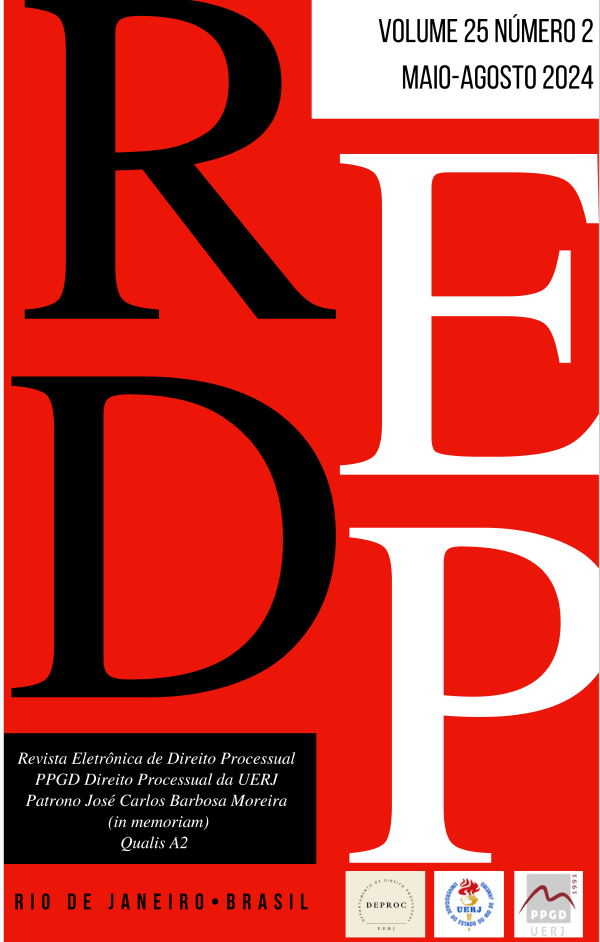A (DES)PROTEÇÃO DO CONSUMIDOR NO TRANSPORTE AÉREO INTERNACIONAL DE PASSAGEIROS: UMA VISÃO EUROPEIA
DOI:
https://doi.org/10.12957/redp.2024.85257Abstract
First, it is important to clarify that the topic we bring here will be approached from a procedural perspective, without neglecting the nature of the disputed material relationship. We will address the main European instruments applicable to international passenger air transport contracts, seeking to highlight their scope and regime, as well as the protection granted to the passenger, traveler/consumer. We will look at the principle of protection of the weaker party in its multiple aspects, forum, applicable law and greater adequacy in terms of contractual balance. We will refer, in this regard, to the rules on jurisdiction in Regulation No. 1215/2012 of the European Parliament and of the Council of12 December 2012 on judicial jurisdiction, the recognition and enforcement of decisions in civil and commercial matters, regarding situations that imply the protection of the weakest party, especially the consumer, seeking to highlight the legislator's option to exclude, in the context of an international passenger transport contract, the forum for the protection of contracts concluded by consumers. We will also address the jurisdiction established by the Convention for the Unification of Certain Rules Relating to International Carriage by Air, of May 28, 1999, especially with regard to its article 33 as a rule of jurisdiction. Finally, we will seek to highlight the options left to the passenger who intends to take action against the airline, asserting the rights recognized by law, without neglecting the option of “dejudicialization” given the impossibility of using the forum for the protection of consumer contracts in general.
Downloads
Published
How to Cite
Issue
Section
License
Copyright (c) 2024 Maria João Mimoso

This work is licensed under a Creative Commons Attribution 4.0 International License.
Todos os artigos publicados na Revista Eletrônica de Direito Processual (REDP) (Departamento de Direito Processual, Universidade do Estado do Rio de Janeiro, Brasil) são licenciados por meio de uma Licença Creative Commons - Atribuição 4.0 Internacional (CC BY 4.0).
Os autores retêm os direitos autorais de seu artigo e concordam em licenciar seu trabalho com a licença CC BY 4.0, aceitando assim os termos e condições específicos desta licença disponíveis no seguinte website: https://creativecommons.org/licenses/by/4.0/legalcode.
- Os autores concedem à REDP o direito de primeira publicação, de se identificar como publicadora original do trabalho e concedem à revista uma licença de direitos não exclusivos para utilizar o trabalho das seguintes formas: Reproduzir, vender e distribuir cópias eletrônicas ou impressas do manuscrito como um todo, de partes específicas do manuscrito e de suas traduções para qualquer idioma;
- O uso do artigo por terceiros é livre, contanto que a integridade da publicação seja mantida e seus autores originais, periódico de primeira publicação e detalhes de citação sejam identificados.
Dentro dos termos da licença, os autores podem entrar em acordos contratuais adicionais separados para a distribuição não exclusiva da versão publicada do trabalho na revista.
Copyright and Licensing
All articles published in the Procedural Law Electronic Review (REDP) (Department of Procedural Law, State University of Rio de Janeiro, Brazil) are licensed under a Creative Commons License - Attribution 4.0 International (CC BY 4.0).
- Authors retain copyright to their article and agree to license their work under the CC BY 4.0 license, thereby accepting the specific terms and conditions of this license available at the following website: https://creativecommons.org/licenses/by/4.0/ legal code.
- Authors grant REDP the right of first publication, to identify itself as the original publisher of the work, and grant the journal a non-exclusive license to use the work in the following ways: Reproduce, sell and distribute electronic or printed copies of the manuscript as a whole, of specific parts of the manuscript and its translations into any language;
- Use of the article by third parties is free, as long as the integrity of the publication is maintained and its original authors, first publication journal, and citation details are identified.
Within the terms of the license, authors may enter into separate additional contractual agreements for the non-exclusive distribution of the published version of the work in the journal.




